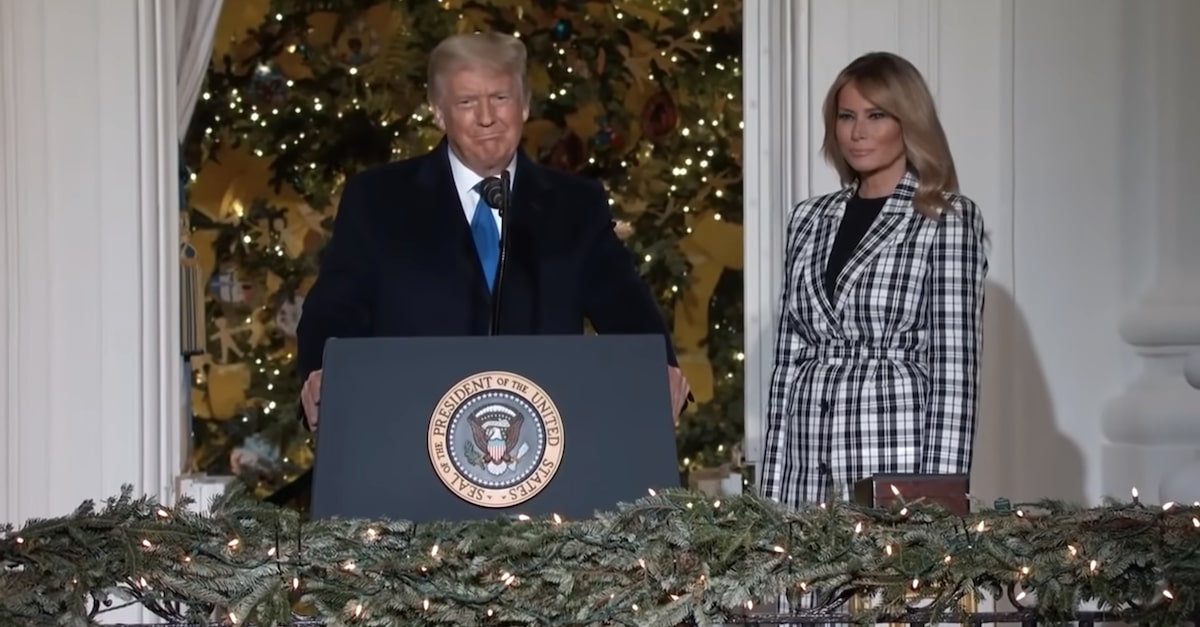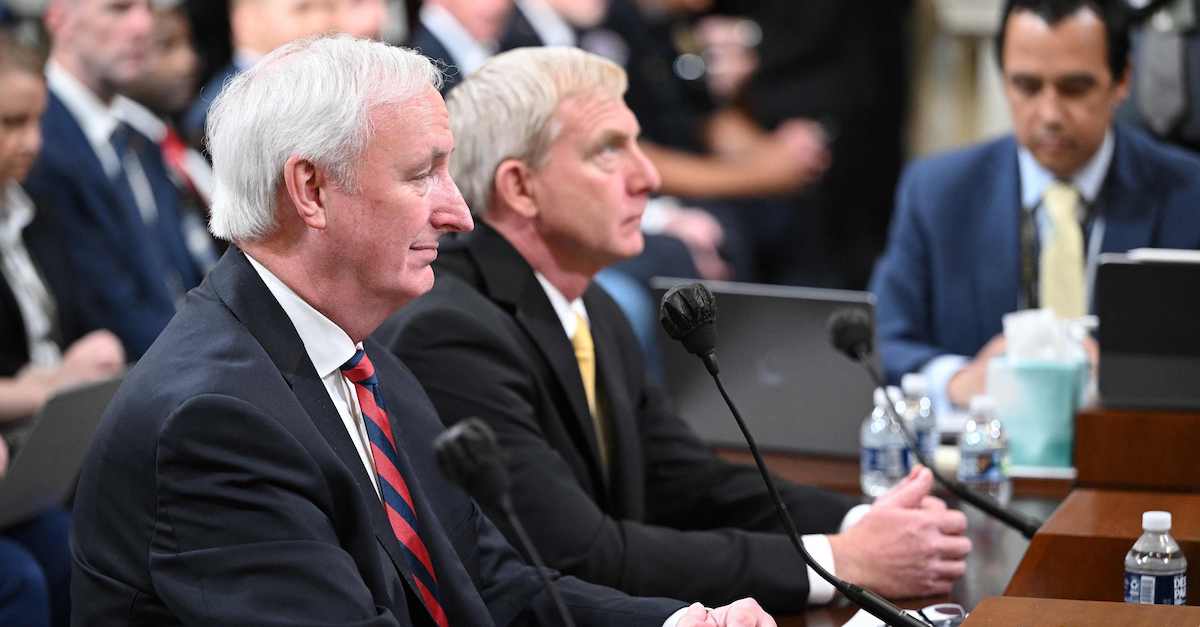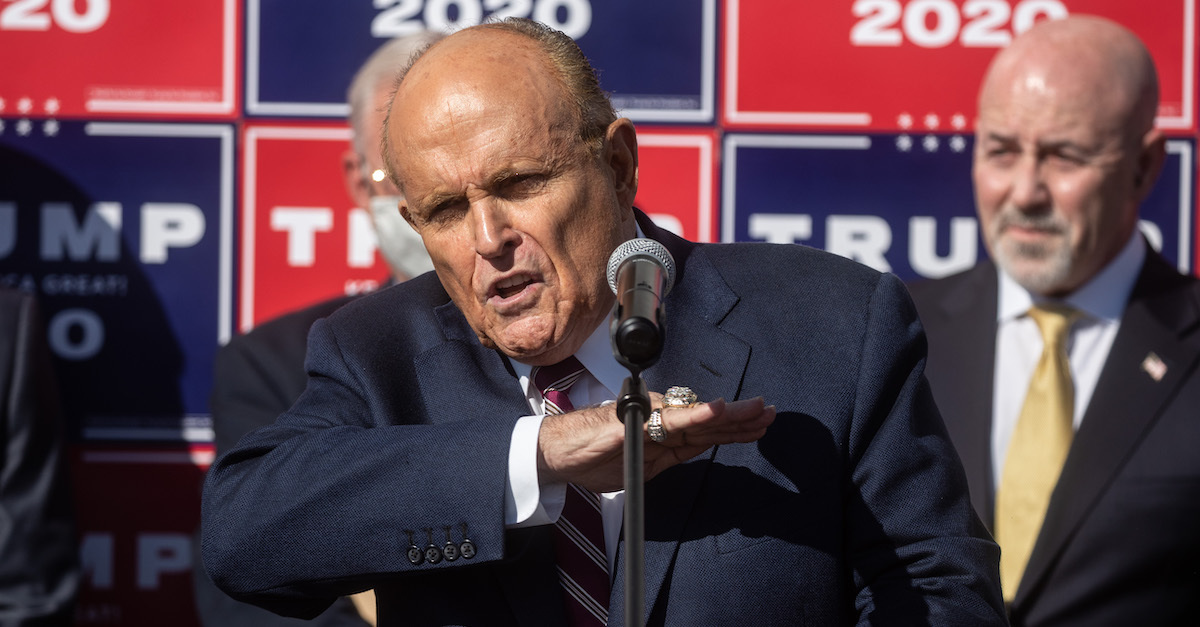
Then-President Donald Trump attends the 2020 Christmas tree lighting ceremony. (Screengrab via White House YouTube)
During Christmas of 2020, what then-departing President Donald Trump wanted was another term in office despite his electoral defeat. The Jan. 6th Committee’s long-anticipated report shows that Trump and his allies did not take off during the holidays in pursuit of that outcome.
Totaling 814 pages, the mammoth report mentions Christmas a dozen times, and the dates of the holiday pop up some 20 more times.
A Christmas Eve Phone Call at DOJ
In broad strokes, the Committee’s report shows Trump, his attorneys, and his allies spending the Yuletide season effectuating various components of their multifaceted plan to overturn the election results. This included attempting to subvert the Department of Justice to install his loyalist Jeffrey Clark as attorney general. Clark was virtually alone among DOJ brass in his devoted belief in Trump’s voter fraud theories.
Ex-Acting Deputy Attorney General Richard Donoghue told the Committee that he described those theories to then-Acting Attorney General Jeffrey A. Rosen as “pure insanity.”
According to the report, Rosen first caught wind of Trump and Clark’s designs during the holiday.
“Acting Attorney General Rosen first learned about Clark’s contact with President Trump in a call on Christmas Eve,” the report states. “On that call, President Trump mentioned Clark to Rosen, who was surprised to learn that Trump knew Clark and had met with him. Rosen later confronted Clark about the contact: ‘Jeff, anything going on that you think I should know about?'”

Former Acting Attorney General Jeffrey A. Rosen (L) and former Acting Deputy Attorney General Richard Donoghue (R) testify during the fifth hearing by the House Select Committee to Investigate the January 6th Attack on the US Capitol in the Cannon House Office Building in Washington, D.C., on June 23, 2022. (Photo by MANDEL NGAN/AFP via Getty Images)
Clark reportedly acknowledged that “he had been at a meeting with the President in the Oval Office, not alone, with other people.”
Such a contact would have been a breach of Justice Department protocol meant to preserve the agency’s independence, and during Trump’s tenure, multiple U.S. Attorneys quit or were fired after raising concerns about perceived interference from the White House. Those former top prosecutors included Preet Bharara, Geoffrey Berman, and Byung “BJay” Pak.
The report depicts Clark’s disclosure of his own contact as a sheepish admission, describing his remarks to Rosen as “kind of defensive” and “somewhat apologetic.”
“Clark’s contact with President Trump violated both Justice Department and White House policies designed to prevent political pressure on the Department,” the report states.
“White House Christmas Tour”
Beyond allegedly working to influence the Justice Department to validate his conspiracy theories, Trump also invited Pennsylvania lawmakers to his Christmas parties in the hopes that they would help him reverse Joe Biden’s more than 80,000-vote victory in the Keystone State. Senator Jake Corman (R), the President pro tempore of the commonwealth’s Senate, decided not to go, but Speaker Brian Cutler (R), accepted the invitation, according to the report.
“President Trump spoke with Cutler on December 3rd, while Cutler, his chief of staff, and their wives were at that White House Christmas tour,” the report states. “The issue of overturning the results of Pennsylvania’s election came up again, as did the possibility of a special session of the State legislature to appoint Trump electors.”
According to the report, Cutler informed Trump that the Senate could not reconvene without an order from Democratic Gov. Tom Wolf or a super-majority of lawmakers, neither of which were likely to happen.
“In Cutler’s opinion, President Trump ‘seemed to understand. And that was—that was clear,'” the report says. “The President’s apparent understanding, however, did not result in any meaningful changes to his public rhetoric.”
The Committee found that Trump or his inner circle engaged in 68 meetings, attempted or completed calls or text messages with state or local officials, trying to influence them to reversal elections in states where he lost.
As the report notes, former New York City Mayor and Trump lawyer Rudy Giuliani had been deeply involved in this and other election-toppling efforts.

Attorney for the President, Rudy Giuliani speaks to the media at a press conference held in the back parking lot of Four Seasons Total Landscaping on Nov. 7, 2020 in Philadelphia, Pennsylvania. (Photo by Chris McGrath/Getty Images)
On Christmas Eve, Giuliani reportedly dialed up two local election officials in Arizona: Bill Gates and Jack Sellers, from the Maricopa County Board of Supervisors.
In his message to Gates, Giuliani is quoted saying: “It’s Giuliani, President Trump’s lawyer. If you get a chance, would you please give me a call? I have a few things I’d like to talk over with you. Maybe we can get this thing fixed up. You know, I really think it’s a shame that Republicans sort of are both in this, kind of, situation. And I think there may be a nice way to resolve this for everybody.”
Giuliani is also recorded making an appeal to party loyalty in his pitch to Sellers.
“I’d like to see if there is a way that we can resolve this so that it comes out well for everyone,” Giuliani reportedly told Sellers. “We’re all Republicans, I think we all have the same goal. Let’s see if . . . we can get this done outside of the court.”
As the report notes, neither Gates or Sellers responded to Giuliani’s entreaties, and the entire board — comprising four Republicans and one Democrat — voted to certify Maricopa County’s election results.
This Christmas, Giuliani’s law license may be in jeopardy after the D.C. Board of Professional Responsibility issued a preliminary finding that the federal lawsuit that he filed seeking to overturn the 2020 election results in Pennsylvania violated at least one ethics rule. Trump, politically weakened from the underwhelming performance of his midterm-endorsed candidate, faces the possibility of criminal prosecution on multiple crimes.
The Jan. 6th Committee referred Trump to the Justice Department, finding reason to believe the former president committed four felonies in his zeal to remain in office. Any decision on prosecution ultimately will be made by Justice Department special counsel Jack Smith, who is also looking into whether Trump broke the law in his handling of classified information.
Editor’s Note: The headline of this story has been changed to clarify the date.